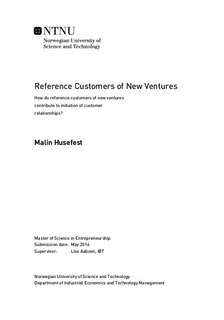Reference Customers of New Ventures - How do reference customers of new ventures contribute to initiation of customer relationships?
Master thesis
Permanent lenke
http://hdl.handle.net/11250/2423754Utgivelsesdato
2016Metadata
Vis full innførselSamlinger
Sammendrag
The purpose of this thesis is to investigate how reference customers of new ventures contribute to initiation of customer relationships. In particular the relationship between the new venture and its initial reference customer will be investigated. This relationship will be investigated within a network approach and from the perspective of the new venture.
The idea that reference customers play an important part in business marketing is generally taken for granted; yet there is limited reported academic research on the phenomenon. Prior research has focused on their use, effectiveness and reference activities (Salminen and Moller, 2006); internal learning from reference customers (Ruokolainen, 2004; Ruokolainen, 2005; Ruokolainen and Mäkelä, 2007; Ruokolainen, 2008) and contextual factors that influence the benefits of the reference customer (Aarikka-Stenroos and Makkonen, 2014). Limited research however has been devoted to how the nature of the relationship between the new venture and the reference customer influence further initiation processes. This thesis will contribute to this gap by investigating the nature of the reference customer relationships with the new ventures, to understand how these reference customers contribute in initiation processes and to understand how the initial reference customer relationship is connected with the further customer relationship pattern of new ventures.
Three research questions are designed to contribute to the purpose of the master thesis. The first research question examines the nature relationship between the new venture and the reference customer with the aim of understanding understands how this initial reference customer has contributed to further customer relationships. The second research question aims to understand how reference customers contribute to the initiation of customer relationships. This research question incorporate aspects such as actor and industry characteristics, as well as the nature of the product. The final research is concerned with the new venture s customer relationship pattern and how the initial reference customer influences this. Combined, these research questions will contrite to understanding how reference customers of new ventures contribute to initiation of customer relationships.
The thesis is carried out by two different sets of data. The first set is the literature review developed and presented by Husefest (2015), which presents relevant theory as well as a conceptual framework that capture the relevant phenomenon. The second set is the empirical data collection gathered through semi-structured interviews. The interviews were held in Spring 2016 by the author of this thesis. The interviewees were representatives from the new ventures, either through the role as the CEO or the Sales Director. The case interviews were selected based on four criteria.
The results of the analysis provide a foundation for understanding the factors that influence the reference customer and the customer development of new ventures. The thesis has found that the initial reference customers often are established within the new ventures network, based on either professional or social ties. The nature of the relationship is closely connected to the whether the relationship is initiated based on social or professional relations as well as the nature of the product. Relationships based on social ties are found to include products with low risks connected to implementation, and there is a larger degree of a personal layer to the relation. Relationships with are higher risks connected to implementation of the product view the personal relations as less important. These are still characterized by a high degree of commitment and trust due to interdependence and the need to being long-term customers. The contribution of the reference customers are closely connected to the industry of which they operate and the nature of the product, and the potential customers are concerned with elements due to these aspects. The thesis has also found a strong connection to the initial reference customer and further customer relationships. New venture recreates a reference customer strategy based on the experiences from the entry market when entering a new market. Thee experiences are strongly connected with their initial reference customer. In conclusion, the initial reference customer relationship is important for both acquiring a potential new customer, but just as much for the strategic customer acquisition strategy of the new venture.
The thesis provides several implications for the new ventures. The main implication lies in the new venture s initial network, whether they are connected with actors with potential opportunities for the new venture. It is suggested that new ventures devote time to develop their social as well as professional network in order to easier recognize opportunities. New ventures are also suggested to devote energy to learn as much as possible about sales processes and industry knowledge, as well as internal capabilities such as sales arguments and customer needs within the initial reference customer relationship. The study does however show that there is room for improvements within the theoretical area of the phenomenon, and recommend that further research continue to add to the research on reference customers. Particularly the author recommends that the research is investigated through the perspective on the reference customer and/or the next potential customers in addition to the new venture, in order to understand their perspective and perception on the phenomenon.
